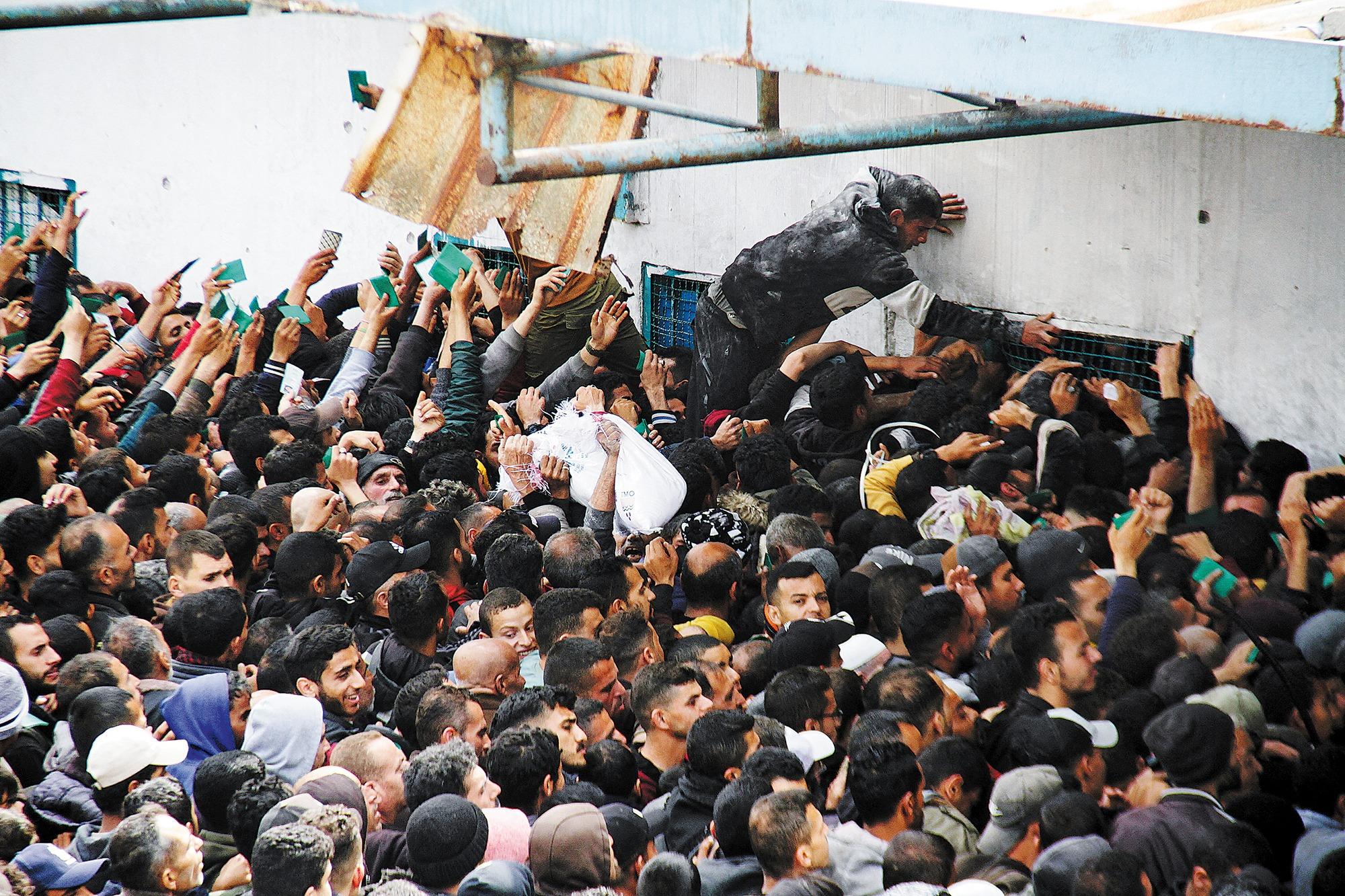Gaza on verge of famine as Israel accused of using aid trucks as ‘pressure card’ in cease-fire talks
 Palestinians gather to receive aid outside a warehouse as people face crisis levels of hunger, amid the ongoing conflict between Israel and Hamas, in Gaza City on March 19m 2024. (PHOTO / REUTERS)
Palestinians gather to receive aid outside a warehouse as people face crisis levels of hunger, amid the ongoing conflict between Israel and Hamas, in Gaza City on March 19m 2024. (PHOTO / REUTERS)
The latest round of contentious cease-fire talks in Qatar ended without a deal, even as Israel is accused of weaponizing starvation as it prepares to attack the city of Rafah in Gaza.
At a weekly press briefing on March 19, Majed Muhammad Hassan Abdullah Al-Ansari, adviser to the Prime Minister of Qatar and Minister of Foreign Affairs and spokesperson, said they were “cautiously optimistic” about the Doha negotiations to stop the war in Gaza, adding that it was too early to talk about progress or successes.
Al-Ansari said the initiative to establish a maritime corridor in Gaza, for which Qatar is playing an important operational role, comes within the framework of a set of initiatives to increase the entry of aid into the Gaza Strip, and that the maritime corridor “does not eliminate the need for unconditional entry of aid through land corridors”.
“It is a shame that the humanitarian issue is on the negotiating table and that aid trucks are used (by Israel) as a pressure card, while we are on the verge of famine in the Strip,” said Al-Ansari.
READ MORE: Gaza an 'open-air graveyard' for 1.1m residents facing famine
Israel has been carrying out military retaliation on the Gaza Strip since an attack by the Palestinian militant group Hamas on Oct 7 during which about 1,200 people in Israel were killed and more than 200 were taken hostage. The Palestinian toll in Gaza has reached 31,819, according to the Hamas-run Health Ministry on March 19.
Israel sent a delegation, led by David Barnea, chief of Israel’s Mossad intelligence agency, to Qatar on March 17 for new truce talks concerning a hostage deal with Hamas. The talks were also attended by Qatari and Egyptian officials.
The Israeli delegation returned to Tel Aviv on March 19, the Times of Israel reported.
On March 20, Israeli Prime Minister Benjamin Netanyahu rejected an appeal from the United States to cancel a ground operation in Rafah, where about 1.5 million displaced Palestinians reside, but agreed to send a delegation to Washington for discussions, Xinhua News Agency reported.
In his meeting with the Knesset Foreign Affairs and Defense Committee on March 19, Netanyahu said that they “are in a dual campaign — a military campaign and a diplomatic campaign”. Both “are interconnected” as the diplomatic fight “gives us the time and the resources” to “reach the full results of the war”.
To complete the elimination of Hamas, it “requires the elimination of the remaining battalions in Rafah” and “the 1.5 battalions in the camps in the center”, he said.
“We have a debate with the Americans over the need to enter Rafah, not over the need to eliminate Hamas, but the need to enter Rafah. We see no way to eliminate Hamas militarily without destroying these remaining battalions,” Netanyahu added.
United Nations Under-Secretary-General for Humanitarian Affairs Martin Griffiths said in a social media post that with famine imminent, “we must flood Gaza with food and other life-saving aid”.
Volker Türk, the United Nations High Commissioner for Human Rights, said on March 19 that the situation of hunger, starvation and famine “is a result of Israel’s extensive restrictions on the entry and distribution of humanitarian aid and commercial goods, displacement of most of the population, as well as the destruction of crucial civilian infrastructure”.
ALSO READ: Israel army seizes Al-Shifa Hospital, Gaza toll at 31,726
“The initial strategy involves negotiating a ceasefire to endure for a duration of six weeks. However, the predominant perspective is that Israel harbors concerns that any pause in hostilities will enable Hamas to reconsolidate its position,” Gokhan Ereli, Gulf studies coordinator at the Center for Middle Eastern Studies in Turkiye, told China Daily.
Despite this, the diminishing rhetoric of political backing for Israel from the US “appears to be a compelling factor driving Israel to the negotiation table”.
“Firstly, Israel is perceived to be employing a strategy of weaponizing starvation against the majority of Gaza’s population, particularly concentrated in the Rafah district along Gaza’s border with Egypt. Israel is reluctant to make concessions at this juncture and incite resistance within Gaza,” Ereli said.
“Concurrently, there is an attempt to weaponize the negotiations by portraying them as the ultimate dialogue, the final round of talks,” he said.
Ereli added that the prospect of reaching an agreement on certain limited issues in these discussions seems more likely than achieving a comprehensive understanding on the anticipated, substantive, and concrete matters.


